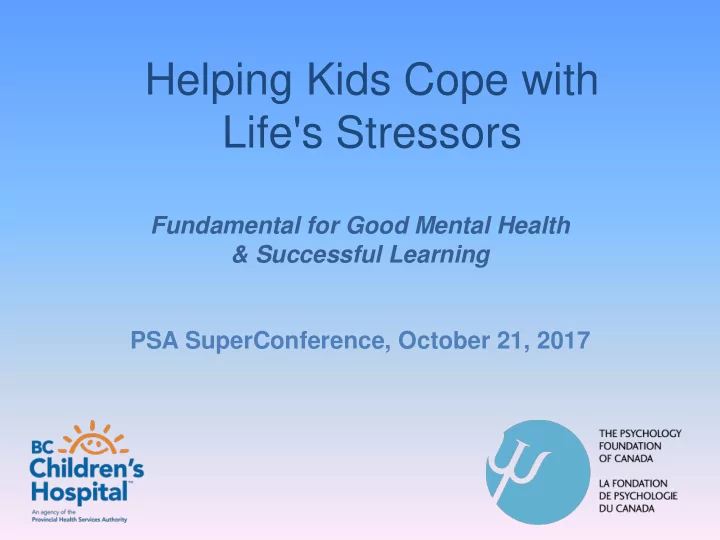

Helping Kids Cope with Life's Stressors Fundamental for Good Mental Health & Successful Learning PSA SuperConference, October 21, 2017
Let’s Start with Why? • We want to help children/youth – recognize and deal with stress – build capacity for self regulation – enhance their health and learning – help teachers create a positive and calm classroom environment • Reduce your own stress
Our Learning Intentions • Understand stress & its relationship to mental health (and life in general!) • Highlight promising approaches and resources that can help people cope with life’s stressors & foster resiliency • Support you in the related work you do with your students, other professionals and parents
The evidence tells us … Creating health Developing health promoting literacy, including environments that build literacy about coping connections with life’s stressors .
Take a look ….
Stress 101 Re-Cap • Stress can be harmful • The way we respond or toxic if it to stress is not fixed - overwhelms our ability our response can be to cope influenced by learning strategies • A consistent, caring adult can make all • What creates stress is the difference! not so much the event that occurs, but the way in which we react to the event
Stress Awareness
For our young people … Group 1: Stressors – what are they? Group 2: Signs and symptoms of stress? (body, mind, feelings & behaviours) Group 3: Strategies they use on their own? Group 4: Strategies that teachers and parents (et al) can use to support them?
Managing Stress
Resources spotlighted …
Understanding & Managing Feelings Child who can recognize, acknowledge and express their feelings appropriately tend to cope better with stress.
Thinking Skills …
Problem Solving
Relaxation Strategies
Relaxation Strategies Stresslr Muscle Relaxation Activity
Feeling Stressed? These can help! www.stressstrategies.ca www.starlingminds.com 21
What about parents?
What if a child becomes “unglued”? Keep calm and dig deeper …. - Use a calm, gentle, firm voice (emotions respond to the tone more than the words) - Is it a typical response? - What’s the reason they are upset? - Is it the situation that needs attention – or is the student is having challenges self- regulating and needs a little help? - Help them apply the skills they’re learning (or come back to this post the moment) - Believe in them and be a coach!
“ We can not always build the future for our youth, but we can build the youth for our future. ” – Franklin D. Roosevel t
Keep in touch! cindypandrew@psychologyfoundation.org meredith.deFreitas@cw.bc.ca
Recommend
More recommend